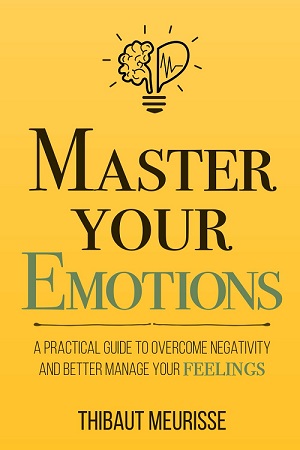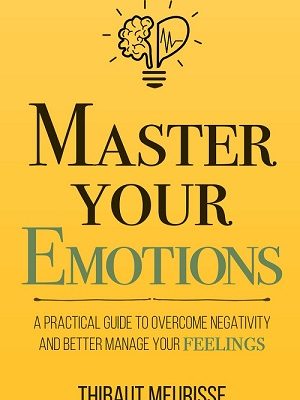In Master Your Emotions: A Practical Guide to Overcome Negativity and Better Manage Your Feelings, Thibaut Meurisse provides a comprehensive approach to understanding and regulating emotions in order to live a more fulfilling, positive, and emotionally balanced life. Below are lessons from the book:

Read: Unbeatable Mind
1. Understanding Emotions and Their Role
- Emotions are signals: Meurisse explains that emotions are not inherently good or bad but are signals that indicate how we are perceiving our environment. Understanding that emotions serve a purpose helps shift the perspective from trying to suppress emotions to using them as guides for action.
- Emotions are shaped by thoughts: A critical insight is that emotions are driven by our thoughts. By changing our thoughts, we can change how we feel. This forms the foundation for emotional mastery.
2. The Importance of Emotional Awareness
- Recognize your emotions: One of the first steps toward managing emotions is becoming aware of them. Meurisse stresses the importance of emotional self-awareness, which helps identify when and why we are experiencing certain feelings.
- Label your emotions: By identifying and labeling emotions (e.g., frustration, anger, sadness), you reduce their intensity. This practice encourages mindfulness and helps you detach from overpowering emotions.
3. Reframing Negative Emotions
- Reframing thoughts: Negative emotions often stem from distorted thinking. Meurisse advocates for cognitive reframing, which involves changing the way you interpret situations. By shifting your perspective and seeing challenges as opportunities, you can turn negative emotions into positive growth experiences.
- Question your thoughts: Negative thoughts are often irrational or exaggerated. Meurisse suggests asking critical questions, like “Is this thought true?” or “What evidence do I have for this belief?” This process helps reduce negative emotional reactions.
4. The Power of Detachment
- Separate emotions from identity: Meurisse explains that emotional mastery comes from detachment—realizing that you are not your emotions. Instead of identifying with anger or sadness, observe these emotions objectively. This detachment helps reduce their power over you.
- Let go of outcomes: Learning to let go of things you cannot control, such as external circumstances or the actions of others, helps foster emotional peace. The focus should be on what you can control: your responses and your mindset.
5. Developing Emotional Resilience
- Emotional resilience is the ability to bounce back from setbacks. Meurisse offers practical strategies, like self-compassion and self-acceptance, which help you recover from emotional turmoil more quickly. By embracing failure and seeing it as part of life, you strengthen your emotional core.
6. The Role of Gratitude in Emotional Mastery
- Gratitude practice: Practicing gratitude daily is a powerful tool for shifting your focus from negativity to positivity. By actively acknowledging the good in your life, you cultivate a mindset that fosters positive emotions and reduces the influence of negative ones.
- The science of gratitude: Meurisse references psychological research showing that gratitude not only boosts happiness but also rewires the brain to think more positively.
7. Self-Talk and Emotional Control
- Positive self-talk: The way you talk to yourself shapes your emotions. Meurisse explains the importance of replacing negative, self-defeating inner dialogue with positive, constructive self-talk. This practice builds self-esteem and enhances emotional control.
- Affirmations: Using positive affirmations can help reprogram the subconscious mind and generate more supportive and optimistic emotional states.
8. Emotional Triggers: Identifying and Managing Them
- Identify emotional triggers: Recognizing what triggers strong emotional reactions (whether it’s stress, specific people, or environments) is essential for emotional mastery. Once identified, you can plan proactive strategies to either avoid or cope with these triggers.
- De-escalation strategies: Meurisse recommends calming techniques such as deep breathing, meditation, and taking breaks to neutralize emotional responses before they spiral out of control.
9. The Role of Habits in Emotional Well-Being
- Build positive habits: Emotional management is greatly influenced by daily habits. Meurisse advises cultivating habits such as regular exercise, adequate sleep, and mindfulness practices to maintain emotional equilibrium.
- Break negative patterns: Conversely, identifying and breaking habits that feed negative emotions—such as rumination, procrastination, or unhealthy coping mechanisms—is crucial to emotional growth.
10. The Importance of Emotional Intelligence
- Developing emotional intelligence (EQ): Emotional intelligence involves recognizing, understanding, and managing your own emotions as well as the emotions of others. Meurisse emphasizes the importance of developing EQ, which includes skills like empathy, self-regulation, and social awareness.
- Impact of high EQ: Individuals with high emotional intelligence can navigate interpersonal relationships more effectively and maintain emotional balance in challenging situations.
11. The Role of Mindfulness in Emotional Control
- Mindfulness practices: Meurisse recommends mindfulness meditation as a way to stay present and fully aware of your emotional state. By staying in the present moment, you can reduce anxiety, calm the mind, and prevent emotional overreactions to stressors.
- Non-judgmental observation: Mindfulness encourages observing your thoughts and emotions without judgment. This practice fosters acceptance and helps diminish the power of negative emotions.
12. The Impact of Your Environment on Your Emotions
- Surround yourself with positivity: Meurisse underscores the importance of creating an environment that nurtures positive emotions. This includes spending time with supportive people, engaging in activities that bring joy, and cultivating spaces that promote relaxation and calm.
- Detox from negativity: Actively removing or limiting exposure to negative influences—whether it’s toxic relationships, stressful environments, or negative media—can help maintain emotional balance.
13. The Role of Purpose in Emotional Health
- Find a sense of purpose: Meurisse argues that emotional well-being is deeply tied to a sense of purpose. When you live in alignment with your values and goals, you feel more fulfilled, which reduces feelings of frustration or sadness.
- Purpose as a compass: Having a clear purpose also provides emotional direction, helping you stay focused and resilient even in the face of challenges.
14. Emotional Processing: Accept and Let Go
- Acceptance over suppression: Meurisse emphasizes the importance of accepting your emotions, rather than suppressing or ignoring them. Allowing yourself to fully feel emotions—even the uncomfortable ones—helps you process them and eventually let go.
- The process of letting go: Letting go of negative emotions doesn’t mean ignoring them but rather processing and releasing them. Techniques such as journaling, talking with a friend, or practicing mindfulness can aid in this process.
15. Empathy and Understanding Others
- Develop empathy: Emotional mastery isn’t just about understanding your own emotions but also about recognizing and responding to the emotions of others. Meurisse encourages cultivating empathy as a way to build deeper, more meaningful relationships and to manage interpersonal conflicts with greater ease.
- Perspective-taking: Developing the ability to see situations from others’ points of view not only enhances your emotional intelligence but also helps you navigate social and professional dynamics with greater emotional insight.
16. Use Emotions as Fuel for Growth
- Emotions as motivators: Emotions can be a powerful source of motivation. Meurisse teaches that negative emotions like frustration or sadness can be channeled into productive energy, helping you to grow and achieve your goals rather than remaining stuck in negativity.
- Transform emotions into action: Instead of being paralyzed by strong emotions, use them to drive forward positive changes in your life.
Conclusion
Thibaut Meurisse’s Master Your Emotions provides practical tools and strategies for gaining control over your emotional life. By understanding emotions, practicing mindfulness, improving emotional intelligence, and reframing negative thoughts, you can develop a healthier, more balanced emotional state. These lessons, if applied consistently, help you manage stress, enhance your relationships, and increase overall life satisfaction (Amazon).



